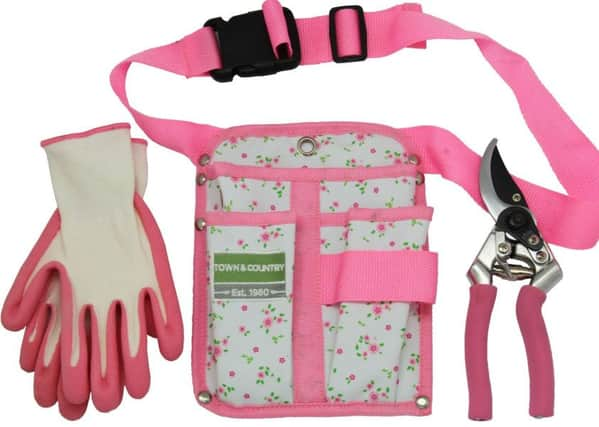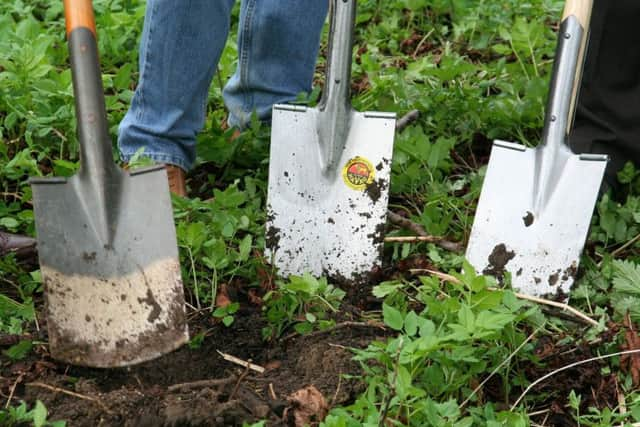Gardening: Buy these products and support Breast Cancer Now


Town & Country is donating a percentage of sales from three new products to Breast Cancer Now.
The charity will receive 10 per cent from limited edition pink gloves, secateurs and a gardening pouch.


Advertisement
Hide AdAdvertisement
Hide AdGardening is ideal exercise – 20-25 minutes every day, or 150 minutes of moderate physical activity a week can help reduce your risk of breast cancer, according to experts.
More than 50,000 women in the UK are diagnosed with breast cancer each year - that’s one in eight.
Head of public health and information at Breast Cancer Now, Eluned Hughes, said: “Twenty or 25 minutes of daily physical activity can reduce your risk of breast cancer and we know that this can include structured exercise as well as other every day activities, such as gardening.
“Any activity that makes you warmer, breathe harder and makes your heart beat faster counts so we would encourage women across the UK to get out and about in their garden this spring and summer.”


Advertisement
Hide AdAdvertisement
Hide AdThe gloves (£4.99) are made of bamboo, which is naturally hypoallergenic and antibacterial so is perfect for gardeners with sensitive skin. With a latex coating, these gloves offer protection against thorns.
The bypass secateurs (£7.99) have a pink cushioned, soft-grip handle and built-in safety catch, making them easy to use, even when wearing gloves, perfect for light pruning. The chrome-plated carbon steel blades can cut branches up to 2cm thick.
Finally, the gardening pouch (£12.99), in a contemporary floral design in pink and white, helps to keep tools, gloves and accessories close by.
With an extendable strap, the pouch can be clipped around the waist or hung from the shoulder. It has three pockets and the eyelet in the front pocket holds twine.
Advertisement
Hide AdAdvertisement
Hide AdFor further information about Breast Cancer Now, visit www.breastcancernow.org and to find out about the new products visit www.townandco.com
GETIN TOUCH
l For more information, plus cook what you grow, recipes, environmental news and more, log on to www.mandycanudigit.com (now smartphone friendly), follow me on Twitter @MandyCanUDigIt or you can like me on my Facebook page at Mandycanudigit
JOBS TO DO THIS WEEKEND
Roses will benefit from feeding with a granular rose fertiliser as they come into growth. Finish pruning established bush and standard roses as they start growing but before any leaves unfurl.
Plant strawberry runners in hanging baskets to grow in the greenhouse for summer crop.
Advertisement
Hide AdAdvertisement
Hide AdSow seeds in modules/pots in an unheated greenhouse: broad beans, leeks, lettuce, rocket, coriander, peas and Swiss chard. Sow sweet peppers, chillies, tomatoes, cucumbers, aubergines, celery and globe artichokes in a propagator.
Divide clumps of herbaceous perennials that you want to propagate, those that have become too large for their allotted space. Divide hostas before they come into leaf.
Repot established Agapanthus into slightly larger containers. Plant begonia and Gloxinia tubers in pots.
Prune out old stems of elder (Sambucus) to promote new growth from the base.
Advertisement
Hide AdAdvertisement
Hide AdPlant summer-flowering bulbs, such as such as Gladioli, Tigridia, Galtonia, Eucomis, Anemone, lily and Acidanthera. Prepare the soil first, to make sure that drainage is enough to prevent the bulbs rotting.
Propagate dahlias from tubers. Pot them up in multi-purpose compost so that the old stalk is just above the surface. Water and place in a warm, light place or in a propagator. Once the fresh shoots have grown to 7.5-10cm (3-4in), cut them off with a knife. Dust the ends with hormone rooting power and push them into a pot containing cuttings compost. Place back in a propagator or plastic bag until roots appear.
Mulching with a deep layer of organic matter helps to condition the soil, suppress weed growth, insulate plant roots from temperature fluctuations, and conserves soil moisture during summer.
Feed borders with a general-purpose fertiliser, such as Growmore.
Advertisement
Hide AdAdvertisement
Hide AdMulch raspberries, blueberries, cranberries and lingonberries with well-rotted farmyard manure (not mushroom compost as it is too alkaline).
Untie canes of blackberries and hybrid berries that have been bundled together for winter, and train into arches before the buds burst.
Feed crops that have stood all winter, such as kale or chard.
Start preparing runner bean supports and trenches for sowing (in May) or planting out (in June).